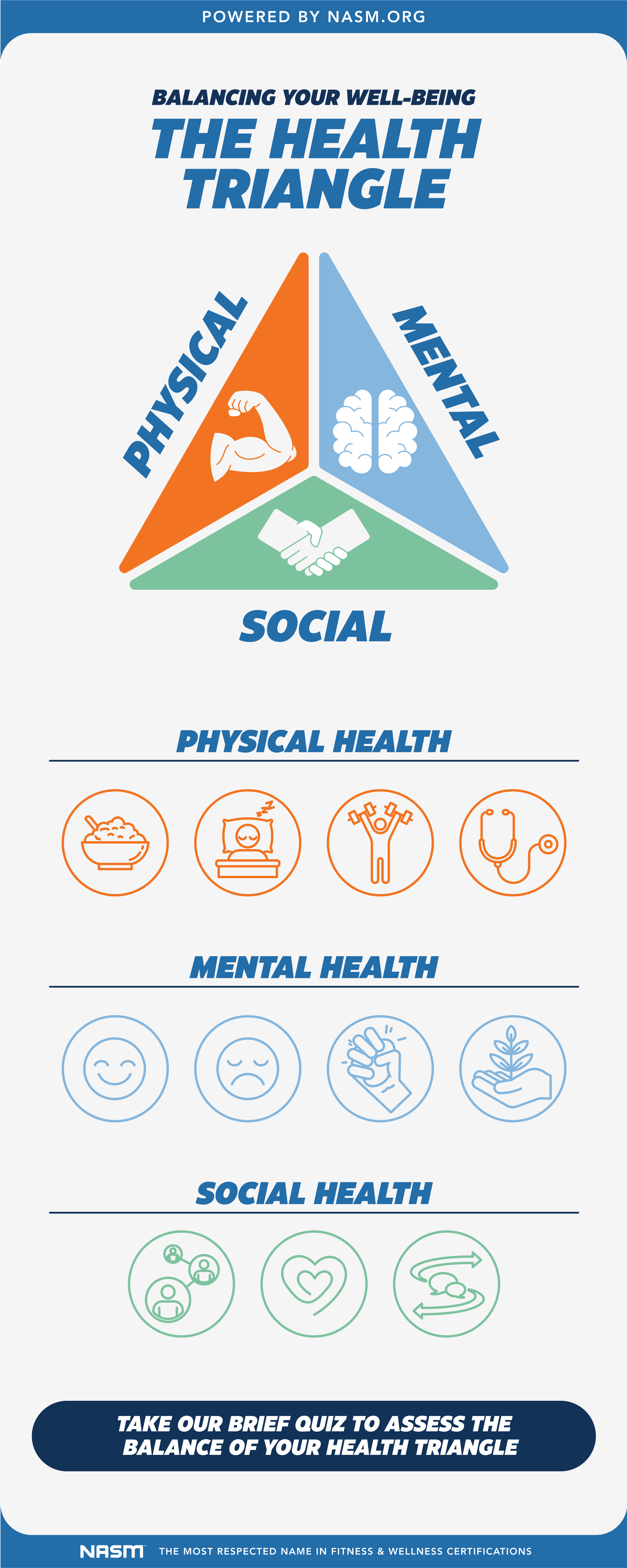Are you someone who struggles with balancing your well-being? With all the health and wellness information available it’s easy to feel overwhelmed, unsure how to spend your time, energy, and resources to craft a well-balanced wellness practice.
The health triangle is a framework and visualization tool to help you understand the three key aspects of overall well-being: physical, mental, and social health. Each of these areas is interconnected and plays an important role in achieving balance.

What is the health triangle?
Initially created as a school project and embraced by the World Health Organization, the Health Triangle is a tool for understanding and balancing your own unique well-being. While most of us are familiar with physical and mental health, it’s sometimes difficult to know where to spend our time and energy.
Further, social health is an often-overlooked aspect of wellness. By embracing and understanding the health triangle you can use this visualization and self-assessment tool to get a better understanding of your own areas of opportunity.
One benefit of the Health Triangle is the recognition that separation between the aspects of wellness is a misleading myth. In fact, your physical, mental, and social well-being are interconnected, and each have an impact on one another. The balance between these 3 aspects is paramount to your longevity and satisfaction with life.
What is Physical Health?
Physical health is likely the aspect of the health triangle you find most familiar. Physical health refers to the state of the body and its ability to thrive in everyday life. This aspect of the triangle includes nutrition, exercise, sleep, and the absence of disease. Our physical health impacts mood, vitality, physical capability, and overall quality of life.
What is Mental Health?
Mental health is another commonly known aspect of well-being. In the case of the health triangle, it refers to your emotional and psychological well-being and includes the balance of negative and positive emotions, your relationship to yourself, how you tolerate and manage stress, and your resilience to life’s challenges. While many people conceive of mental health as the absence of mental health issues, the field of Positive Psychology has added tools and ideas of mental fitness and the positive sides of life.
What is Social Health?
Social health relates to the quality of your relationships and interactions with others and is an often-overlooked aspect of well-being. Human beings are social, and we require a support network and shared beliefs to be well. This aspect of the health triangle includes communication skills, support, the feeling of belonging, and the sense that each of us matters. Dr Isaac Prilleltensky at the University of Miami refers to as “being valued and adding value.”
Why is the Health Triangle Important?
The health triangle is a tool to help you gauge the balance of your overall health. As an equilateral triangle, with equal sides, it represents the equally important aspects of health and well-being. Many of us have been taught to prioritize our physical health but may not be considering our mental or social aspects as important.
Or, some people may prioritize friends and community contributions, so neglect sleep and exercise. By taking the time to assess the balance of your own health triangle you can address the areas of your well-being you may otherwise neglect.
Imbalance in the Health Triangle
When we neglect an aspect of our health that domain can become unbalanced. In the absence of balanced practice, the individual can start to languish, eventually weakening or negatively impacting other aspects of overall health. For example, loneliness has been linked to negative outcomes in mental and physical health. While connection is an aspect of the social side of the triangle, languishing connection negatively impacts the other two.
.png?width=4201&height=2443&name=Infographic%2012%20HorizontalV4%20(1).png)
Factors that Affect Balance
The factors that affect our health and well-being are referred to as determinants of health. Some determinants are outside of our control, such as culture of origin or genetics. Others, like behavior and reaching out for support, are within our control. While recognizing imbalance can feel overwhelming, it’s important to also recognize what we can do to shift the balance.
According to the World Health Organization, these are the Determinants of Health:
- Genetics and Personal Characteristics – The aspects of an individual that are not malleable, including genetic disorders and predispositions, gender and sexual identity, race, and the lasting effects of life experiences that cannot be easily changed.
- Environment – Including social, economic, and physical environment. Some are malleable, such as finding a supportive community. Others are less so, such as environmental pollution that is inescapable.
- Behaviors – This aspect refers to our self-care, mindset, and lifestyle choices as well as avoiding adverse behaviors like drug and alcohol abuse.
- Education – The WHO recognizes that those with lower education levels are likely to have poor health outcomes and struggle more with stress and lack of confidence and self-efficacy.
- Medical Care – Access to and regular use of preventative care and disease treatment help to maintain physical and mental health and well-being.
- Social – Support from family, friends, and community organizations as well as customs, traditions, and beliefs that can have a beneficial or adverse effect on health status.
Is Your Health Triangle Balanced?
Take our brief quiz to assess the balance of your health triangle
Instructions: Answer each yes or no question. Tally the points for each section and compare the balance for each category. In a balanced health triangle, the three factors would be a similar score.
Physical
- Do you regularly engage in movement that feels good for your physical body?
- Do you get between 7-9 hours of sleep most nights?
- Do you eat a balanced, nourishing diet and consistent meals?
- Do you regularly see your primary care doctor and other health professionals?
- Do you consistently care for your physical hygiene?
- Do you avoid tobacco, abusing alcohol, or using other drugs such as THC?
Mental
- Do you feel you have an awareness of your current state and your thoughts?
- Do you understand your emotions and feel you interpret them accurately?
- On most days do you feel more positive emotions than negative?
- Do you know what your strengths are and regularly use them?
- Do you feel you could identify goals and grow to achieve them?
- Are you hopeful for your future?
Social
- Do you have one or a few close friends you keep in regular contact with?
- Can you safely express your emotions or thoughts to your close friends and family?
- Do you have a set of shared values with your community or culture?
- If you struggled financially are their people in your life that could support you?
- Do you feel you have healthy boundaries with the people closest to you?
- Are there people you can go to for advice &/or others come to you with their problems?
Instructions: Answer each yes or no question. For each "yes" response, allot one point. Tally the points for each section and compare the balance for each category. In a balanced health triangle, the three factors would be a similar score. Add up your scores from each of these questions.
Reflection
Reflect on your results above to gain insight into your areas of opportunity using the following reflection questions:
- Are the areas of your health triangle equal? Why or why not?
- How do you think the balance or imbalance presents itself in your life?
- Using what you already know about your life and your health, what might you do to maintain or improve your health balance?

Maintaining Balance
With busy lives, careers, families, and lots of demands on our time and attention, maintaining a healthy lifestyle can be a challenge. Fortunately, rebalancing the Health Triangle does not always mean a major life overhaul. There are relatively simple things that can be done to benefit our mental, physical, and social health.
Physical
- Getting between 7-9 hours of sleep per night and improving overall sleep hygiene.
- Eating a diet including sufficient protein, vegetables, and an appropriate number of calories for your level of activity.
- Consistently moving your body throughout the day and engaging in movement that aligns with your goals and well-being.
- Seeing your primary care physician for regular checkups and monitoring any health considerations.
Mental
- Learn to practice mindfulness through meditation or another related practice.
- Use journal prompts to build emotional intelligence and connect with your inner experience.
- If you experience signs of mental illness, connect with a mental health professional such as a therapist or clinical social worker.
- Take the Values in Action Character Strengths Assessment to learn more about your strengths.
Social
- Invite others to join you for your other health activities such as walks outside or to share a meal.
- Learn about communicating to build relationships or how to have challenging conversations.
- Volunteer for a cause that is meaningful to you or represents your values.
- Be willing to ask for help and support, even when it means being vulnerable to those you love.
When to Seek Support
It’s not uncommon during the journey to well-being to feel stuck, lost, or like it’s taking longer to grow than you had expected. During those times it can be helpful to know who to seek out for help and support.
- When to speak with a mental health professional: If you are experiencing regular, intense negative emotions or acute negative emotions that impact your ability to perform day to day tasks. You’ll also want to consider speaking with a mental health professional to work on coping with trauma or integrating intense, adverse experiences from your past.
- When to hire a Wellness Coach: A wellness coach supports an individual’s efforts to learn both the technical information and the skills to build lasting wellness. This information and skills are then used to build and maintain the foundations of your wellness triangle.
Regardless of if you are seeking therapy or coaching, you’ll want to seek out a qualified professional to ensure the information you receive is accurate and their practice is ethical.
How to Become a CWC
If you’ve been on a wellness journey and are interested in supporting others on their path to wellness, consider becoming an NASM Certified Wellness Coach. A wellness coach plays a vital role in guiding and empowering their clients on a transformative journey towards a healthier and more fulfilling life.
This journey encompasses a comprehensive understanding of various domains of wellness, including physical, mental, emotional, social, and even spiritual well-being. Through personalized coaching and support, a wellness coach helps individuals navigate these domains and attain a harmonious balance.
Final Thoughts
With so many wellness practices available, the Health Triangle can be a supportive tool in knowing what to prioritize. It can be helpful to remember that many of the best practices in physical, mental, and social wellness are interconnected. Something as simple as taking a walk with a friend can boost all three; and doing it regularly can help keep your health triangle more in balance.

















